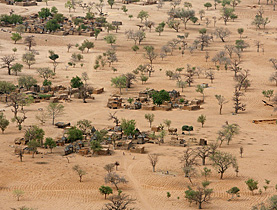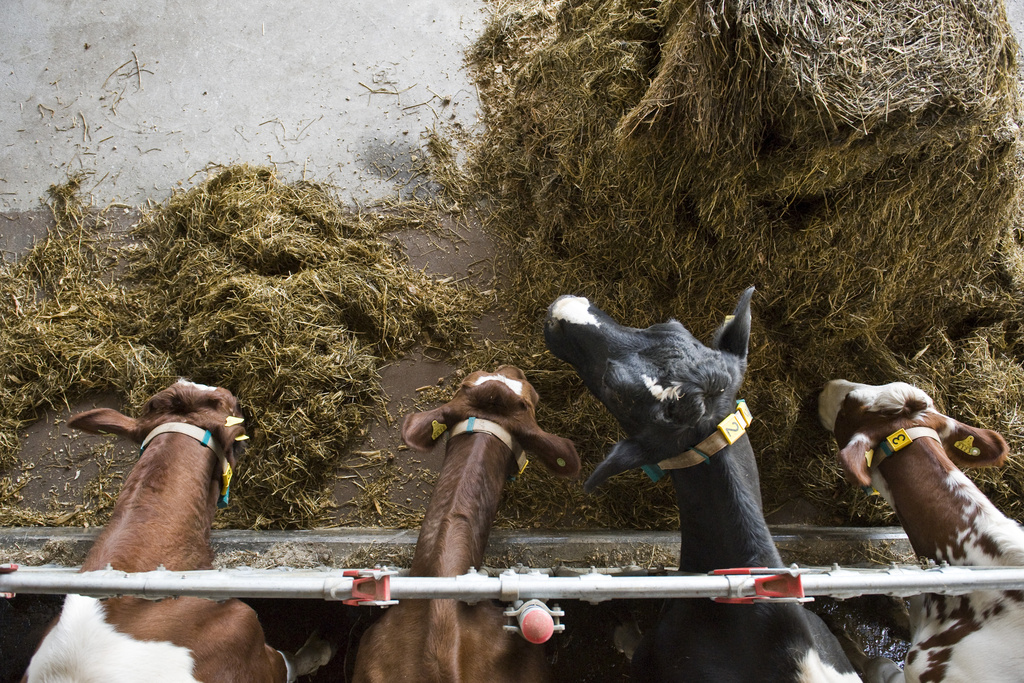Emissions lie at heart of climate change remedy

A leading Swiss scientist is appealing for emission reductions to top the agenda at the United Nations Climate Change Conference in Cancun later this month.
Politicians are still unwilling to tackle the issue head-on, and in the meantime harmful CO2 levels continue to build up in the earth’s atmosphere, where they will remain for hundreds of years, Fortunat Joos tells swissinfo.ch.
According to Joos, who heads the Oeschger Centre for Climate Change Research in Bern, the world needs to urgently “shift gears” in combating climate change.
The conference in Cancun will discuss measures including reducing greenhouse gas emissions, climate finance and the future of the Kyoto Protocol.
swissinfo.ch: What do you feel are the main stumbling blocks for tackling climate change today?
Fortunat Joos: Solving climate problems would require strong reductions in emissions from fossil fuels burning right now. There appears to be a lack of willingness among politicians and populations to act now and to reduce emissions. Some of the largest parties do not support any action in this direction and do not even acknowledge that we have a problem. Lobby organisations seem to be very powerful in confusing public opinion.
It is also a human thing. It is very hard to change habits.
swissinfo.ch: Is enough research being done into climate change?
F.J.: Some of the very basic facts have been known for decades or even centuries. On the other hand, the earth’s systems are very complex. There is still a great deal to learn about the details of interactions and feedbacks in the climate system, and about the impact of changes in the acidity of the ocean that go along with CO2 emissions. Something that people are very much interested in – and with which we still have problems – is understanding exactly and in a very quantitative way how climate change will impact on the regional level and in everyone’s backyard. So there’s still a need for research.
swissinfo.ch: With the National Climate Change Research programme running and two research institutes now set up, is Switzerland well placed to play a major role in interdisciplinary research in the field?
F.J.: Traditionally in Switzerland we are really a stronghold of climate change research. We are contributing to international efforts and participating as a community in new projects. As far as the quality of the science in Switzerland is concerned, I know we have a high output. But at the same time I think we also need to be careful.
The Swiss national climate programme NCCR will end in 2013 and unfortunately there are no plans for another. This is a concern because although we have local centres such as the climate centre in Zurich or the Oeschger Centre here in Bern, we also need to have coordination among all the groups in Switzerland to move climate research forward.
swissinfo.ch: Do you think the UN process is helping or hindering tackling climate change globally?
F.J.: Emission reductions must of course occur locally, everywhere. Many of the incentives and regulations must come from different levels, such as communities, cantons, federal government. The Rio UN Framework Convention on Climate Change is a very strong protocol and in my opinion sets the right goals and the right directions. The main call of this protocol is to stabilise greenhouse gas levels to prevent dangerous climate change. Implementation is now difficult but in the international arena I don’t see another way to proceed than the UN process. But it needs to be supported as well on other levels.
swissinfo.ch: Do you have hope that it will succeed in the end?
F.J.: Of course. There are signs that things could change in the right direction and people are becoming more and more aware that solving the climate change problem is also an opportunity. It usually takes decades to change public opinion and to actually implement changes. The process started in the 1980s and 1990s and now it takes time.
swissinfo.ch: Do we have time? There is a feeling that we have to get things done quickly…
F.J.: I agree that we have to move on quickly. There’s a huge inertia in the climate system: as we emit CO2 today then out of one kilogramme, 200 grams will still be in the atmosphere in a thousand years. This makes it really urgent that we shift gears. We need to change trends. And this has to happen soon. If we don’t do this then it is likely, according to our projections, that if we have high emissions and continue on the current path then we will have warming of several degrees by the end of the century.
swissinfo.ch: What are your impressions of the main package of decisions that will be discussed in Cancun – a long-term shared vision, reducing greenhouse gas emissions, adaptation to change, climate finance and the future of the Kyoto Protocol?
F.J.: What is needed on the international level is that basically CO2 emission reduction measures and reductions for other greenhouse gases are implemented and enforced, and that stringent goals are set. A long-term shared vision is of course needed to reach this reduction in greenhouse gas emissions globally. There is also a need to have financing so the less developed countries can actually take measures and at the same time there is also a need to adapt to the ongoing climate change.
I really hope that the emission reductions will be set in place in time. Personally I am sceptical that something concrete will happen in Cancun as different parties like to wait until the last minute before coming to an agreement. The Kyoto Protocol lasts until 2012.
swissinfo.ch: What do you say to people who are sceptical about the extent of climate change?
F.J.: We are disrupting the climate system in a very strong way and very quickly. That’s not something we scientists have invented. It is what is found by doing measurements. We have measurements that document that greenhouse gas concentrations are increasing, the energy budget of the atmosphere is changing, and the planet is warming. We know the time scales and underlying chemistry of CO2 uptake by the ocean from hundreds of thousands of measurements. Climate change is real and it’s here.
Joos is the current president of the Oeschger Centre for Climate Change Research at Bern University.
He is also a professor at the university’s Physics Institute of Climate and Environmental Physics and is involved in the third phase of research at the National Climate Change Research programme.
His research specialities are carbon cycles, bio-geochemical circulation and modelling.
Joos has co-authored around 100 scientific papers on climate change.
He served as vice-chair of the Intergovernmental Panel on Climate Change’s Working Group 1 which prepared a third assessment report on climate change. He has contributed to special reports for the panel.
The next UN Climate Change Conference takes place in Cancun, Mexico from November 29 to December 10.
The negotiating process revolves around sessions of the signatory parties to the UN Framework Convention on Climate Change (UNFCCC), which meet annually to review how the convention is being implemented.
Talks over new accords have made progress on some issues ahead of Cancun but organisers have played down chances of a breakthrough.
Subjects to be discussed include a long-term shared vision, adaptation, reducing greenhouse gas emissions, climate finance, and the future of the Kyoto Protocol.
The UN and Mexico say progress has also been made on setting up funding for developing nations to cope with the effects of climate change, as well as the thorny issue of measuring and verifying countries’ emissions of greenhouse gases but that a deal to replace the Kyoto Protocol was farther off.
The protocol, the UN’s main tool for curbing greenhouse gas emissions, expires at the end of 2012.
More than 120 nations agreed in Copenhagen in 2009 to find a way to limit the rise in average global temperatures to less than 2 degrees Celsius but differences remain over how to achieve that goal.
The slow pace of the UN talks has prompted speculation that the Group of 20 or the US-led Major Economies Forum may emerge as possible avenues to agree climate action – a move opposed by the UN as well as many small countries that stand to be the worst hit by climate change.

In compliance with the JTI standards
More: SWI swissinfo.ch certified by the Journalism Trust Initiative












You can find an overview of ongoing debates with our journalists here . Please join us!
If you want to start a conversation about a topic raised in this article or want to report factual errors, email us at english@swissinfo.ch.